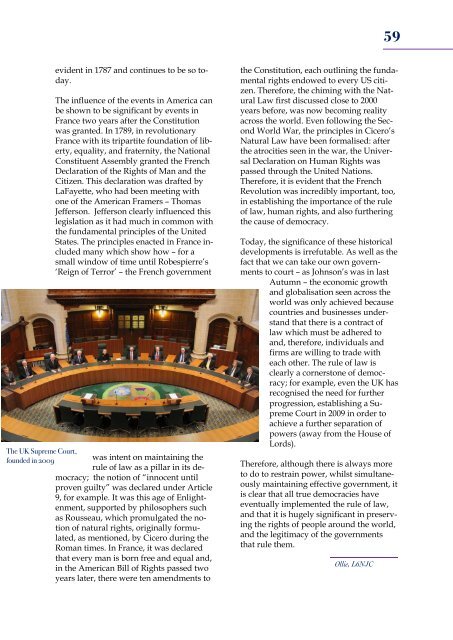You also want an ePaper? Increase the reach of your titles
YUMPU automatically turns print PDFs into web optimized ePapers that Google loves.
59<br />
evident in 1787 and continues to be so today.<br />
<strong>The</strong> influence of the events in America can<br />
be shown to be significant by events in<br />
France two years after the Constitution<br />
was granted. In 1789, in revolutionary<br />
France with its tripartite foundation of liberty,<br />
equality, and fraternity, the National<br />
Constituent Assembly granted the French<br />
Declaration of the Rights of Man and the<br />
Citizen. This declaration was drafted by<br />
LaFayette, who had been meeting with<br />
one of the American Framers – Thomas<br />
Jefferson. Jefferson clearly influenced this<br />
legislation as it had much in common with<br />
the fundamental principles of the United<br />
States. <strong>The</strong> principles enacted in France included<br />
many which show how – for a<br />
small window of time until Robespierre’s<br />
‘Reign of Terror’ – the French government<br />
<strong>The</strong> UK Supreme Court,<br />
founded in 2009 was intent on maintaining the<br />
rule of law as a pillar in its democracy;<br />
the notion of “innocent until<br />
proven guilty” was declared under Article<br />
9, for example. It was this age of Enlightenment,<br />
supported by philosophers such<br />
as Rousseau, which promulgated the notion<br />
of natural rights, originally formulated,<br />
as mentioned, by Cicero during the<br />
Roman times. In France, it was declared<br />
that every man is born free and equal and,<br />
in the American Bill of Rights passed two<br />
years later, there were ten amendments to<br />
the Constitution, each outlining the fundamental<br />
rights endowed to every US citizen.<br />
<strong>The</strong>refore, the chiming with the Natural<br />
Law first discussed close to 2000<br />
years before, was now becoming reality<br />
across the world. Even following the Second<br />
World War, the principles in Cicero’s<br />
Natural Law have been formalised: after<br />
the atrocities seen in the war, the Universal<br />
Declaration on Human Rights was<br />
passed through the United Nations.<br />
<strong>The</strong>refore, it is evident that the French<br />
Revolution was incredibly important, too,<br />
in establishing the importance of the rule<br />
of law, human rights, and also furthering<br />
the cause of democracy.<br />
Today, the significance of these historical<br />
developments is irrefutable. As well as the<br />
fact that we can take our own governments<br />
to court – as Johnson’s was in last<br />
Autumn – the economic growth<br />
and globalisation seen across the<br />
world was only achieved because<br />
countries and businesses understand<br />
that there is a contract of<br />
law which must be adhered to<br />
and, therefore, individuals and<br />
firms are willing to trade with<br />
each other. <strong>The</strong> rule of law is<br />
clearly a cornerstone of democracy;<br />
for example, even the UK has<br />
recognised the need for further<br />
progression, establishing a Supreme<br />
Court in 2009 in order to<br />
achieve a further separation of<br />
powers (away from the House of<br />
Lords).<br />
<strong>The</strong>refore, although there is always more<br />
to do to restrain power, whilst simultaneously<br />
maintaining effective government, it<br />
is clear that all true democracies have<br />
eventually implemented the rule of law,<br />
and that it is hugely significant in preserving<br />
the rights of people around the world,<br />
and the legitimacy of the governments<br />
that rule them.<br />
Ollie, L6NJC


















